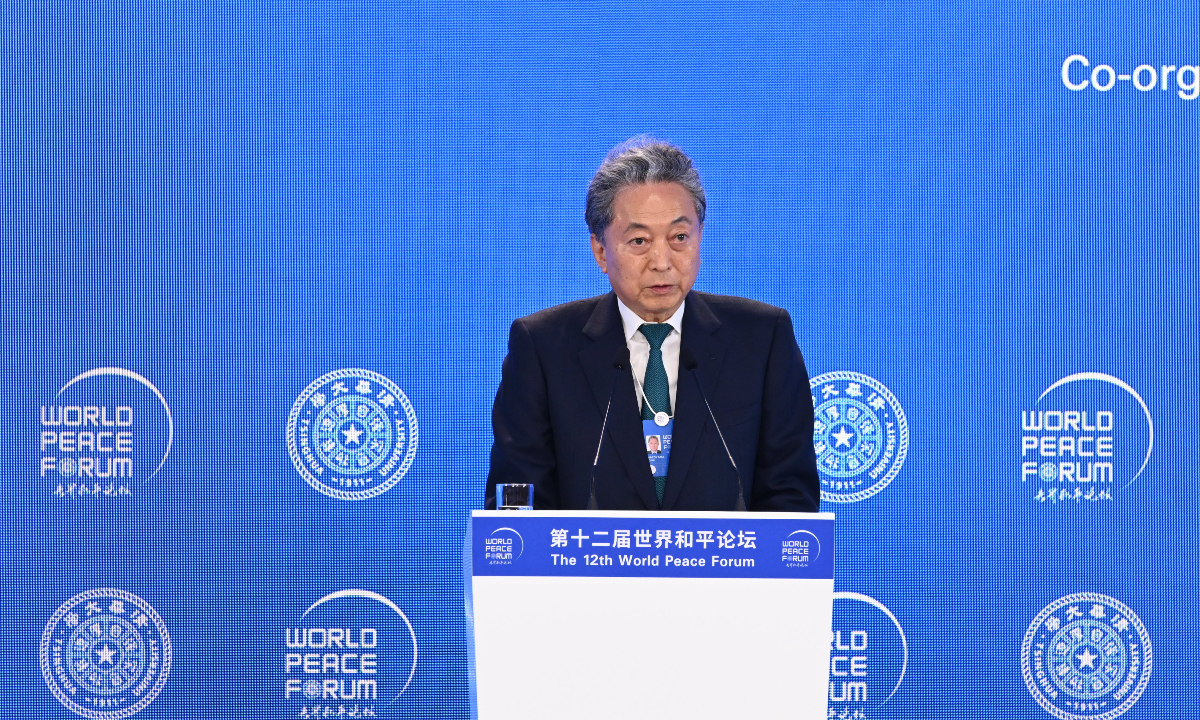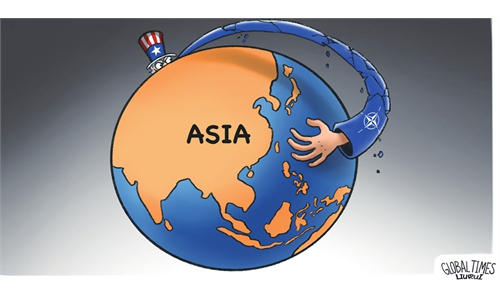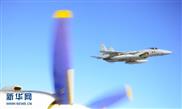Former Japanese PM calls on Japan to abandon one-sided stance toward the US, play as bridge between China and US

Former Prime Minister of Japan Yukio Hatoyama speaks at plenary session of the 12th World Peace Forum (WPF) in Beijing on July 6, 2024. Photo: Courtesy of WPF
Over the past few years, the Japanese government has not only failed to act as a bridge in China-US relations but has also become the most reliable ally of the US in military and diplomatic matters. This largely reflects Japan's tendency to follow in America's footsteps after its defeat in World War II, former Prime Minister of Japan Yukio Hatoyama said at a plenary session of the 12th World Peace Forum in Beijing on Saturday.
The forum is taking place from Friday to Sunday in Beijing under the theme of "Improving Global Security Governance: Justice, Unity, and Cooperation."
The former Japanese official also called on Japan to act as a bridge in China-US relations and work to ease and manage opposition between the world's two largest economies, which aligns best with Tokyo's national interests.
Recently, Japan has even been encouraging the US from behind the scenes, fearing any softening of US policy toward China, Hatoyama said. "I believe this is because the mainstream thought within the Japanese government now views China as an enemy, advocating for a hardline approach to counter China."
In December 2022, the Japanese cabinet approved a national security strategy that identifies China as the country's greatest strategic challenge to date. At the same time, it regards the island of Taiwan as an important partner and friend, sharing fundamental values such as democracy, with close economic ties and cultural exchanges.
"This description is more explicit and extreme than that in the Biden administration's national security strategy," the former Japanese PM said.
Since the outbreak of the Russia-Ukraine conflict in February 2022, Prime Minister Fumio Kishida has repeatedly stated domestically and internationally that "today's Ukraine could be tomorrow's East Asia." Hatoyama criticized this, stressing that such a claim is unfounded and far-fetched.
"However, government officials and bureaucrats, in pursuit of excessive defense capabilities, have been inciting anti-China policies and repeatedly promoting this narrative. Given the already negative sentiment among the Japanese public toward China, rhetoric about the 'China threat,' regardless of its veracity, is easily accepted," he said.
"Consequently, many citizens and media outlets have been misled, leading to the issue becoming increasingly difficult to resolve."
Hatoyama pointed out that a recent development that concerns him is "the new [regional] leader of Taiwan seems to be trying to exploit the China-US conflict in an attempt to take an unconventional path."
On May 20, the regional leader of the island Lai Ching-te's inaugural speech was vastly different from that of his predecessor. It not only violated the basic consensus of the normalization of Japan-China diplomatic relations but also posed a threat to regional peace and stability, the former Japanese PM noted.
"I believe that the erroneous messages sent to [the island of] Taiwan by Japanese and American politicians in recent years have emboldened the new [regional] leader. However, if the [regional] leader thinks that playing the democracy card allows for any action, that is a grave mistake," he said.
He urged the governments of Japan and the US to demonstrate through words and actions that they do not support "Taiwan independence" secessionist acts.
Hatoyama pointed out that China's national strength will be on par with the US in the future, and thus the competition between China and the US will be seen over the long-term. "However, I still believe that acting as a bridge in China-US relations and easing and managing the opposition between China and the US best aligns with Japan's national interests," the former Japanese PM said.
"I have always firmly believed that if a military conflict were to occur between Japan, the US, and China, regardless of the outcome, all parties would suffer catastrophic consequences. Therefore, Japan's national strategic goal must be to prevent the outbreak of war."
The idea that Japan alone can contain China, which will always be a superpower, is an unrealistic fantasy, even with the US involved, he said.
Japan is an influential middle power, located between China and the US, and hosts US military bases, making its conditions quite unique. It should be able to play a significant role as a bridge in China-US relations, he noted.
"However, the main prerequisite is that Japan must not maintain a one-sided stance toward the US; otherwise, it will not gain China's trust," Hatoyama said. "Unfortunately, the current China-Japan relationship is still far from this ideal."
Since the leaders' summit between China and the US last November, ministerial exchanges have increased. Although the tone of opposition has not changed, they are effectively implementing so-called "guardrail diplomacy," the former Japanese official said.
European countries and, more recently, Australia are accelerating their communications with China. In contrast, exchanges between Japan and China appear rather limited, he noted.
However, it is not completely blank. Leaders of the two countries met at the end of 2023. On May 27, the Japan-China-South Korea leaders' meeting was held in Seoul, South Korea, for the first time in four and a half years.
Following this, Liu Jianchao, head of the International Department of the Communist Party of China (CPC) Central Committee, visited Japan, holding meetings with Prime Minister Kishida and senior members of various parties. Similarly, in mid-May, 20 senior officers of the People's Liberation Army visited Japan for the first time in five years and engaged in exchanges with the Self-Defense Forces.
"I have heard that Japanese Ambassador to China Kenji Kanasugi frequently visits various parts of China, actively participating in economic and cultural exchanges. The emergence of such signs of communication between Japan and China is indeed encouraging, but whether this communication can be sustained and yield significant results remains to be seen," Hatoyama said.
Promoting genuine Japan-China communication in Japanese politics and improving public sentiment toward China are crucial, he added.
To enhance people-to-people exchanges and improve Japanese sentiment toward to China, the former Japanese official suggested immediately restoring the limited visa waiver for Japanese tourists to China.
Japanese people who have been to China have a better impression of China, while Chinese people who have been to Japan have a better impression of Japan, Hatoyama noted.
"I also hope that the Japanese government will handle the issue of Chinese official visas flexibly and support China in taking the step to restore visa-free travel. If Japan continues a diplomatic tug-of-war due to a rigid political stance, it will only please the hardliners in Japan," Hatoyama said.
In November 2014, the two countries reached a "four-point consensus" and latterly reaffirmed it, clearly stipulating that Japan and China should address the issue of disputed islands through dialogue and consultation to prevent the situation from worsening, the former Japanese official said.
A crisis management mechanism should be established to avoid unforeseen circumstances. For most Japanese people, the island of Taiwan is essentially unrelated to them, but with increasing reports of tensions over the island, people may start to feel it is related to them. The "four-point consensus" is an intergovernmental document confirmed by the Abe Cabinet, but its current status is somewhat ambiguous, he noted.
"I sincerely hope that these contents will soon be recognized as a high-level intergovernmental political document, alongside other political documents such as the Japan-China Joint Communique," he said.
If the worst-case scenario were to occur between Japan and China, such as a conflict between China and the US escalating into a state of war, what would happen? "As everyone knows, there are many US military bases in regions like Okinawa, Japan. These bases would likely be used to launch missiles or air strikes against China, which would lead to the worst-case scenario. Naturally, China would retaliate against these US bases in Japan," Hatoyama said.
From Japan's security perspective, our strategy must aim to prevent such a situation from occurring. Japan is strengthening its military capabilities, perhaps with the thought that if a conflict arises, Japan could join forces with the US. "However, this cooperation with the US could lead to devastating consequences. Relying on military strength to contain the situation is, in my opinion, a mistake," Hatoyama said.
We should resolve issues with our neighbors, especially China, through dialogue as stipulated in political documents, if any conflicts arise. To this end, mutual trust between the two countries needs to be strengthened, he noted.
"I have always said that despite differing values, countries should respect each other, build trust, and help each other. This is crucial for preventing the outbreak of war in Asia," Hatoyama said.



